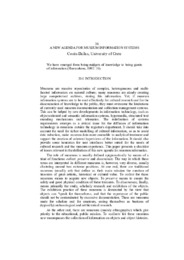A new agenda for museum information systems
Abstract
Museums are massive repositories of complex, heterogeneous and multi-faceted information on materal culture; many museums are aleady creating large computerised archives, storing this information. Yet, if museum information systems are to be used effectively for cultural research and for the dissemination of knowledge to the public, they must overcome the limitations of currently used museum documentation and collection management systems. For this purpose, it is argued, firstly, that museum information systems should provide adequate support for the complexity of museum information, demonstrated in such traits as specialisation, part aggregation, temporality, spatiality, dense conceptual relationships, sujectivity and context dependency, multimediality and textuality; secondly, that they should provide access to existing, currently paper-bound information, not just normalised descriptions; thirdly, that the same integrated system should cater equally for scholarly research as for communication with the museum visitor.
